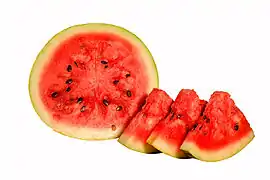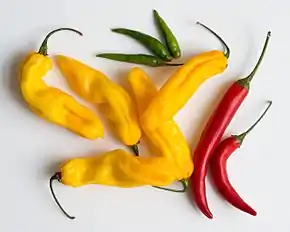savory
See also: Savory
English
Alternative forms
- savoury (British; usually only for etymology 1)
Pronunciation
- IPA(key): /ˈseɪvəɹi/
Audio (US) (file)
Etymology 1
From the Middle English savory, savourie, from Old French savouré, from Old French savourer, from Late Latin sapōrāre, present active infinitive of sapōrō, from Latin sapor (“taste, flavour”), from sapiō, sapere (“taste of, have a flavour of”).
Adjective
savory (comparative savorier, superlative savoriest) (American spelling)
- Tasty, attractive to the palate.
- The fine restaurant presented an array of savory dishes; each was delicious.
- Salty and/or spicy, but not sweet.
- The mushrooms, meat, bread, rice, peanuts and potatoes were all good savory foods.
- umami, modern The template Template:rfclarify does not use the parameter(s):
2=what is meant by "modern"? Is this a usage label or can this word actually mean modern?
Please see Module:checkparams for help with this warning.(clarification of this definition is needed)- The savory rabbit soup contrasted well with the sweet cucumber sandwiches with jam.
- (figuratively) Morally or ethically acceptable.
- Readers are to be warned that quotations in this chapter contain some not so savory language.
Synonyms
- See also Thesaurus:delicious
Translations
tasty, attractive to the palate
|
salty or non-sweet
|
Etymology 2
Wikispecies From Middle English saverey, possibly from Old English sæþerie, from Latin satureia, influenced by or via Old French savereie.
Noun
savory (countable and uncountable, plural savories)
- Any of several Mediterranean herbs, of the genus Satureja, grown as culinary flavourings.
- The leaves of these plants used as a flavouring.
Derived terms
Translations
herb of genus Satureja
|
References
- “savory”, in OneLook Dictionary Search.
This article is issued from Wiktionary. The text is licensed under Creative Commons - Attribution - Sharealike. Additional terms may apply for the media files.





